Posted by Elena del Valle on July 7, 2006
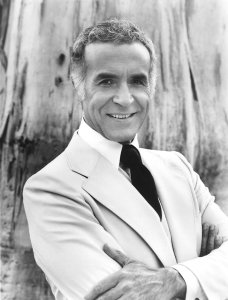
Ricardo Montalban’s American high school diction teacher inspired his future as one of Hollywood’s most recognizable Mexican Americans, seen here as Fantasy Island’s “Mr. Roarke”
Photo: Photofest and Shades of L.A./Los Angeles Public Library
WLIW will redistribute “The Mexican Americans,” originally produced in 2000, nationwide on public television in August 2006. According to promotional materials actor Ricardo Montalban, comedian Paul Rodriguez, singers Vikki Carr and Tish Hinojosa, former U.S. Secretary of Energy Bill Richardson, director Luis Valdez (“La Bamba”), activist Dolores Huerta, artists, politicians, journalists, and community leaders share their personal stories during the program.
According to the film producers, Mexican Americans defended this nation in every war in the 20th century, becoming among the highest decorated ethnic groups. “The Mexican Americans” looks at the Mexican diaspora and its various waves such as the “accidental immigrants” who found themselves on the other side of the California and New Mexico borders at the end of the U.S.-Mexican war; the miners and railroad workers who came after the Mexican Revolution; and the migrant farmers who came to the United States when their Mexican ranchos were taken from them. “The Mexican Americans” endeavors to showcase the challenges they overcame, and the changes that their children have affected in the United States.
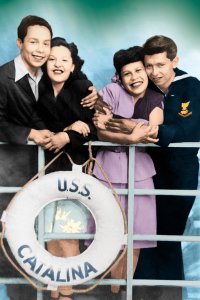
World War II servicemen and their girlfriends
For the migrant farmer, traveling up and down the United States following crop seasons or a wage increase of as little as two cents a bushel, playwright and director Luis Valdez recalls in the program, home “was a question mark.” But as many in the program recognize, this sacrifice reaped the American Dream, and when the children of these laborers succeeded, they never forgot where they came from.
Comedian Paul Rodriguez shares an emotional account of the day he handed his father the deed for the 40 acres of farmland his parents worked to provide for the family when he was a small boy. He was able to make the purchase from a level of success they never imagined possible for themselves.
The program also focuses on Mexican-Americans’ ability to improve the quality of their experience in the United States within a generation; and the late Cesar Chavez and Dolores Huerta’s efforts. The program includes archival film and photos blended with modern footage of communities in California, Texas, and New York in order to portray the Mexican American community’s heritage.
“The Mexican Americans” is the twelfth program in WLIW New York’s series of cultural documentaries celebrating the diversity of America, which also includes “The Cuban Americans” and “The Puerto Ricans: Our American Story.” It was produced by Roy Hammond, executive producer; Roman Brygider, producer and director; and producers Robin Llompart and Blanca Santos.
Posted by Elena del Valle on July 6, 2006
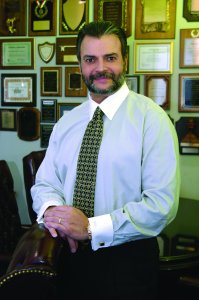
George L. San Jose, president and COO, San Jose Group
Photo: The San Jose Group
Chicago, Illinois – The San Jose Group’s “El cerdo es bueno” campaign earned a 2006 Bronze EFFIE® Award as the “best Hispanic marketing program of the year.” According to The San Jose Group representatives, the campaign increased pork consumption among Hispanics despite their initial misconceptions about pork’s health benefits and quality.
“Our office literally erupted in cheer when we were notified that we won an EFFIE,” said George L. San Jose, president and COO, The San Jose Group. “We pride ourselves on delivering results for our clients. To have our campaign judged as the year’s best in our industry is a career highlight for our team.”
“We are absolutely thrilled. It shows that we are not only capable of changing this by a margin, but we radically changed consumer behavior,” said Jennifer Woods, executive vice president, The San Jose Group. “We changed perspective and behavior which ultimately increases sales.”
The company launched the campaign, which translates into “Pork is good,” in 2002 on behalf of the National Pork Board to promote “the other white meat” to Hispanics. Initial research revealed that Hispanics had misconceptions about pork. Many thought pork was unhealthy because of its fat and cholesterol content and that it posed health risks like trichinosis, a parasitic disease caused by eating raw or undercooked pork.
Utilizing television, outdoor, radio and print advertising, website development, retail promotions and public relations, The San Jose Group embarked on an integrated marketing campaign to convince Hispanics that pork is healthy and safe to eat. The public relations component included an intense media relations effort that enlisted sources to provide culturally relevant information about pork’s nutritional value as well as pork production and quality control practices in the United States.
The San Jose Group believes that the campaign resulted in a 75 percent increase in pork purchase among Hispanics. Company representatives estimate that the editorial coverage they secured approximated 31 million gross impressions, and the equivalent of $1.7 million in media value.
The EFFIE® Award, sponsored by the New York American Marketing Association, is said to honor results. The San Jose Group, one of the oldest independent Hispanic marketing agencies in the U.S., was the only Hispanic agency to receive an EFFIE® this year. The San Jose Group is a consortium of marketing communications companies specializing in reaching the Spanish-speaking Americas. — Sergio Carmona
Posted by Elena del Valle on July 5, 2006
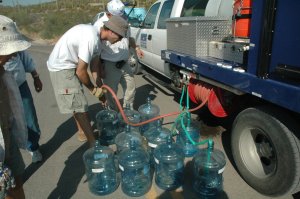
Humane Borders volunteers fill water bottles
Photos: Kent Brodie
Los Angeles, California – Victor Favela, president of Delgada y 30, plans to place $60 bottles of his weight loss product throughout the Arizona desert. Why, you may wonder. According to Favela, due to drastic measures in areas of California and Texas by the Department of Homeland Security Border Patrol and civilian militias, more than 40 percent of undocumented immigrants crossing the border in the last weeks have been forced to cross through the Sonora dessert in Arizona.
The former surgical technologist is not alone in his resistance to U.S. border policy. Concerned members of local nonprofit organizations have been helping for years. Paisanos al Rescate has been using low-flying planes to drop water bottles in the desert; and Humane Borders, a nonprofit organization based in Tucson, Arizona, maintains water stations in the desert.
Faith motivated Humane Borders offers humanitarian assistance through more than 83 emergency water stations on and near the U.S.-Mexican border. Paisanos al Rescate, a volunteer driven nonprofit, drops water and information with parachutes along the Texas, New Mexico, Arizona and California borders with Mexico. The chutes include methods for recipients to signal the aircraft in a life threatening situation. In those cases, Paisanos al Rescate will assist in coordinating rescue efforts with the U.S. Border Patrol Search and Rescue (BORSTAR).
“More than 2,000 undocumented immigrants have died in the desert since 1998,” said Favela. “It’s sickening to see so many people die unnecessarily. There is an all natural ingredient called pepino espinoso in every capsule of my product. It’s made from a cactus like plant discovered over 2,300 years ago by an ancient tribe of the Kalahari desert in South Africa. They’ve been using it for centuries to curb appetite and thirst while they trek across the desert.”
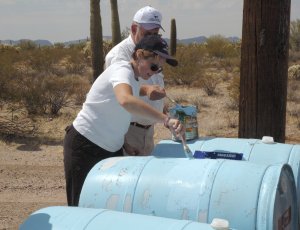
Painting water tanks
Water distribution has saved many lives. But according to volunteers, dropping drugs or other substances in the dessert could be dangerous to people and animals. Not everyone agrees that distributing weight loss products in the dessert is a good idea.
“We’ve given away over 75,000 gallons (of water) in five years and we know that people are alive today because they had water from our water stations. I would be against any kind of drug or substance that alters their perception of what their body needs,” said Sue Goodman, executive director of Humane Borders. “It’s very scary.”
The Humane Borders, a 501(c) (3) organization established in 2000 by Rev. Robin Hoover, water stations vary. Some consist of one 65-gallon barrel of water and others may have a dozen barrels, emergency rations, first aid kits and, in winter, warm clothes. Through collaboration with authorities, such as the U.S. Border Patrol and Consulate of Mexico, Humane Border representatives have a detailed map they use to determine the location of the stations on public and private lands.
Hundreds of volunteers, including 60 trained drivers, head out to the desert for 70 trips each week. They maintain the stations, refilling the water barrels, picking up discarded items and reporting vandalism. More information is available online at HumaneBorders.org and PaisanosAlRescate.org
Posted by Elena del Valle on July 3, 2006
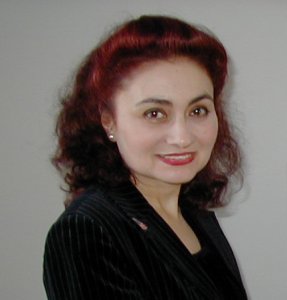
Nara Venditti, Ph.D., CEO, Succeed in America
Photo: Succeed in America
A podcast interview with Nara Venditti, Ph.D., CEO, Succeed in America, is available in the Podcast Section of Hispanic Marketing & Public Relations, HispanicMPR.com. During the podcast, she discusses Marketing to Hispanics through Educational Resources with Elena del Valle, host of the HispanicMPR.com podcast.
During her career she has worked as an educator and in-house international assignment consultant. The author of 65 published works, she is a third-generation educator and the recipient of a State of Connecticut citation for her dedication to making a difference in the community. Her recent books are How to Get a Job in the USA and Ameri$peak.
Throughout her 25-year career, she has worked with adult students in the academic and business environments. She is an adjunct lecturer at Western Connecticut State University and the Yale University Summer Business School. She writes a column in Tribuna, S-Business magazine, the magazine of the Association for Service Management International, and Mobility, a magazine for domestic and international relocation. She hosts “Community Forum,” a Connecticut public television program. In 2005, she was honored by the Connecticut Refugee and Immigrant Coalition.
To listen to the interview, scroll down until you see the “Podcast” on the right hand side, then select “HMPR Nara Venditti” hit the play button or download it to your iPod or MP3 player to listen on the go, in your car or at home. To download it, click on the arrow of the recording you wish to copy and save to disk. The podcast will remain listed in the July 2006 section of the podcast.
Click the button to hear the podcast:
Click here to sponsor a HispanicMPR.com podcast
Posted by Elena del Valle on June 30, 2006
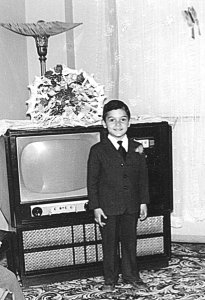
Jimmy Smits prepares for his first childhood visit to la Isla, circa 1963
Photos: courtesy of Jimmy Smits and WLIW New York
WLIW will distribute “The Puerto Ricans: Our American Story,” a program about Puerto Rico originally produced in 1999, a second time nationwide in August 2006. Entertainer Rita Moreno, late musician Tito Puente, actors Ricardo Montalban, Jimmy Smits and Miriam Colón, singers Justino Díaz and Ednita Nazario, author Esmeralda Santiago, tennis player Gigi Fernández, and former Governor Pedro J. Rosselló share their personal stories.
Filmed in the continental United States and on the island of Puerto Rico, the program explores the customs and traditions that have bonded Puerto Rican families for generations.
The show’s producers set out to illustrate how Puerto Rico’s customs, traditions, music, and dances define the identity of a growing American community. According to them, these cultural connections are so powerful for Puerto Rican families they exist even for those living on the mainland who have never been to the island. They say that for those who have been to Puerto Rico there is an inextricable bond to the island.
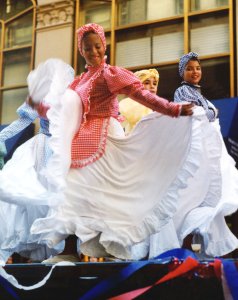
The spectrum of Puerto Rican music and dance includes plena, whose rhythms and traditional costume reflect the island’s African influence, Hispanic Day Parade, New York City, October 1998
Jimmy Smits describes the preparations for his first childhood visit at age five as if it were a religious ceremony; with starched white shirt, vest, suit and tie. According to author Esmeralda Santiago (When I Was Puerto Rican), being Puerto Rican American is “like a child jumping double Dutch… two ropes [Puerto Rican and American identity] going in opposite directions very quickly… it is a constant juggling, a constant jumping up and down trying to be in one place or another.”
This duality put tennis player Gigi Fernandez at a crossroads as she prepared for the 1992 Summer Olympics in Barcelona and had to choose between representing the mainland or the island. Fernandez talks in the program about her personal struggle with the two worlds of Puerto Rican life as “a hard emotional decision but a very easy career decision” because she knew the only way she would win was on the U.S. team. Representing the United States that summer, Fernandez became the first Puerto Rican woman to win an Olympic gold medal.
“The Puerto Ricans: Our American Story” was produced by WLIW New York. They have produced other public television specials celebrating the diversity and ethnic character in America such as “A Laugh, a Tear, a Mitzvah” (Jewish Americans); “The Cuban Americans;” “The Polish Americans” and “The Mexican Americans.” The production team included Ron Rudaitis, director; Roy Hammond, executive producer; Ron Rudaitis and Sam Toperoff, producers; Yvonne Rodriguez Sanchez and Robin Llompart, associate producers; and Sam Toperoff, writer.
Posted by Elena del Valle on June 29, 2006
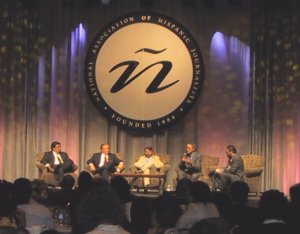
Lunch panelists Ray Suarez, Rev. David Beckmann, Lou Dobbs, Jorge Castañeda, and The Honorable Bill Richardson
Photos: Elena del Valle and Melissa Gonzalez
The National Association of Hispanic Journalists (NAHJ) hosted its 24th annual Convention and Media Career Expo in Fort Lauderdale, Florida recently. More than 1,400 print, broadcast and online media representatives from across the country attended eighty workshops and seminars and took advantage of networking opportunities during the four days of the event.
Several of the presentations, including a day long workshop and a luncheon, one of the events with the highest attendance, focused on immigration issues. Ray Suarez moderated “The Great American Immigration Debate” with panelists Rev. David Beckmann, president, Bread for the World; Lou Dobbs, anchor and managing editor CNN’s Lou Dobbs Tonight; Jorge Castañeda, professor New York University, and The Honorable Bill Richardson, governor, New Mexico.
There were sessions in English and Spanish on dealing with stress, changes in media, photojournalism, and even the downfalls of using Spanglish, a blending of English and Spanish. Speakers and panelists ranged from network executives to newspaper columnists. Maria Elena Salinas, an Emmy-award winning anchor of Noticiero Univision, and Henry Alfaro, a newscaster and founding member of the California Chicano News Media Association, were inducted into the NAHJ Hall of Fame.
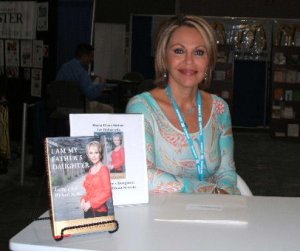
Maria Elena Salinas
Immigration reform was a constant theme throughout the Convention. Sometimes with so much emphasis the topic took over the seminar. This was the case in “Missing the Mark: Newsroom Diversity In a Time of Latino Activism” where Chicano activist Juan Jose Gutierrez called immigrant workers modern day slaves.
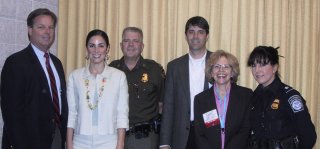
Panelists of the all-day workshop “Immigration-A Hand’s on Workshop for Better Coverage in Your Community”
A controversial interview took place via satellite with Ricardo Alarcon the president of the Cuban National Assembly. Among the topics discussed was the treatment of journalists in the communist nation.
The convention included a Media Career Expo where sponsors had booth space. Media represented in the exhibit space included South Florida newspapers the Sun Sentinel and The Miami Herald as well as national media such as ESPN and National Public Radio. — Melissa Gonzalez contributed to this article.
Posted by Elena del Valle on June 28, 2006
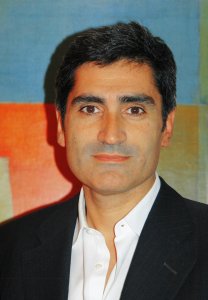
Alejandro Cosentino, CEO, Voy Music
Photos: Voy Music, Starmedia.com
Miami, Florida – StarMedia and Voy Music recently launched StarMedia Radios, a joint online digital Latin music service powered by Voy. According to promotional materials, StarMedia Radios provides “the broadest selection of Latin music available online,” a network of 26 originally programmed radio stations, a music store, the world’s first Latin music virtual record label as well as podcasting, and news.
StarMedia Radios’ new media player offers streaming music and news that is “fully integrated” with other services including viral networking features allowing users to rate, recommend and share specific selections with friends.
“The launch of StarMedia Radios will provide StarMedia’s customers with a leading-edge digital entertainment platform to discover, explore and enjoy all facets of the Latin music experience,” said Alejandro Cosentino, CEO, Voy Music. “The service is intuitive and comprehensive, allowing Latin music fans to fully search, select, consume and share all things relevant to their passion for Latin music and the best of Latin culture.”

Juan Jose Nuñez, vice president, Operations, Starmedia
“StarMedia has continually sought to strengthen its brand by developing the variety and relevance of its content. The new StarMedia Radios service will significantly enhance our user’s online experience, through an innovative, cutting-edge digital music service, the latest in a series of recent upgrades to the portal,” said Juan José Nuñez, vice president of operations, StarMedia.
Starmedia.com is a free-to-web service connecting approximately 18 million Spanish-speakers through the Internet. Voy Music executives describe their company as a next generation platform dedicated to the discovery, promotion and marketing of Latin music. StarMedia has local operations in Mexico, Spain and the United States (Los Angeles, Miami and New York). It is wholly owned by Wanadoo, a subsidiary of the France Telecom Group and one of Europe’s largest online companies.
Posted by Elena del Valle on June 27, 2006

Yvonne Latty, author and NAHJ panelist
Photo: Andrea Cipriani
On Friday, June 16, a panel of journalists, anti-war activists, and Iraqi veterans voiced their concern for the media coverage of the Iraqi war and offered suggestions to improve the coverage of individual soldiers, particularly Hispanics, in the workshop “Through the Looking Glass: Latinos in the Iraqi war.” The panel was held during the National Association of Hispanics Journalists convention held at Greater Fort Lauderdale/Broward County Convention Center.
Art Ruson, anchor for KTRK-TV, was panel moderator. Also on the panel were Yvonne Latty, author of In Conflict: Iraq War Veterans Speak Out on Duty, Loss, and the Fight to Stay Alive; Curt L. Brownhill, Air Force Command chief master sergeant, United States Central Command; Jorge Medina, an anti-war activist who lost his son in the war; Camilo Mejia, former National Guard sergeant and conscientious objector to the war; and Juan Rodriguez, sergeant. They discussed the media’s emphasis on negative issues and the failure to focus on stories that could help people learn more about the purpose of Latino soldiers.
“A lot of people view Hispanics as undocumented immigrants with what’s going on in the media,” said Rodriguez following the workshop. “I would say (of) those who go to Iraq, 50 percent or more of those are Latinos. I think along with everything else you get labeled and it’s important to look closer because a lot of Hispanics are joining military because we are proud warriors and its part of our culture.”
During the workshop, the panelists discussed the lack of media coverage for Latino soldiers and their impression that because of it the public has differentiated Latino soldiers even though they were just as focused as any troop in Iraq. Panelists also mentioned that many stories were overlooked. Medina commented that media outlets didn’t do as much as they could to cover his son’s death.
The speakers also discussed war exaggerations, fabrications, and the notion that negative issues sell much more for the media. According to some of the panelists, this notion has created anxiety and frustrations for them, especially for Latty who was bashed by some media during her book tour. The presenters expressed their concern that the media’s focus may have prompted people to view these soldiers as villains; and their belief that many soldiers want the war to end. The closing thoughts for the workshop involved the panelists’ suggestions for ways to improve Hispanic soldier related coverage.
“There are so many stories in our neighborhood,” said Latty. “Go and interview them because I feel like Vietnam; vets may be seen as the bad guys.” Following the discussion, Latty provided ways to give a voice to Latinos. “Those who are coming home, we have to see who’s Latino and not be judgmental. Latino journalists should look into the community.” — Sergio Carmona
Posted by Elena del Valle on June 26, 2006
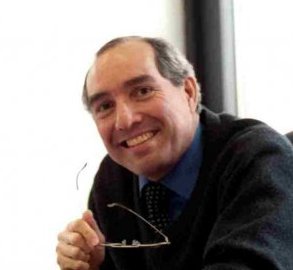
Federico Subervi, Ph.D., professor, School of Journalism and Mass Communication, Texas State University-San Marcos
A podcast interview with Federico Subervi, Ph.D., professor, School of Journalism and Mass Communication, Texas State University-San Marcos and director Latinos and Media Project, is available in the Podcast Section of Hispanic Marketing & Public Relations, HispanicMPR.com. During the podcast, he discusses Latino media issues with Elena del Valle, host of the HispanicMPR.com podcast.
Subervi, who lives in Austin, Texas, is co-author of the “Latino Media: A Cultural Connection” chapter of the Hispanic Marketing & Public Relations book. He directs the Latinos and Media Project, an emerging non-profit organization dedicated to the gathering and dissemination of research and resources pertaining to Latinos and the media.
In addition to his academic work, Subervi serves on editorial boards, and has been an advisor or consultant to various public and private entities such as Nickelodeon, Scholastic Entertainment, The Corporation for Public Broadcasting, Fox Family Worldwide, the National Research Council & Ford Foundation Fellowship Program, the National Latino Children’s Institute, and Mothers Against Drunk Driving.
To listen to the interview, scroll down until you see the “Podcast” on the right hand side, then select “HMPR Federico Subervi,” hit the play button or download it to your iPod or MP3 player to listen on the go, in your car or at home. To download it, click on the arrow of the recording you wish to copy and save to disk. The podcast will remain listed in the June 2006 section of the podcast.
Click the button to hear the podcast:
Click here to sponsor a HispanicMPR.com podcast
Posted by Elena del Valle on June 23, 2006
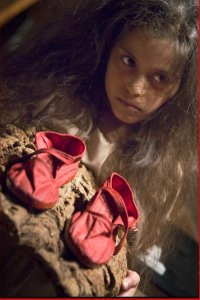
Little Soledad from “Soledad is Gone Forever”
Photo: Ron Koeberer
San Francisco, California – Haiku Films Producer and Director Mabel Valdiviezo will hold a benefit party, silent auction and sneak preview of the short film “Soledad Is Gone Forever” Friday, June 23 at 6 p.m. at the Cultural Center of the New College of California, 766 Valencia Street at 19th. The event is endorsed and supported by the School of Humanities of the New College of California and is sponsored by the Film Arts Foundation.
“We’re completing the shots and once it’s done we’ll be sending it to some of the festivals,” said Valdiviezo. “The goal to make the short film is to show the potential of the feature story.”
“Soledad Is Gone Forever,” a 14-minute film, is described by promoters as “a spellbinding, poetically haunting, psychological drama that explores the long-term human cost of state sponsored violence.”
Based on real accounts, the film is an intimate portrait of a young photographer, Soledad Gonzalez (Carla Ohana Sanchez), a child survivor of the Pinochet era. She witnessed the violent death of her father killed by the Chilean military twenty years ago and erased them from her memory. Through the film viewers follow Soledad’s journey filled with recurring visions and nightmares and her struggle to remain sane until she remembers her traumatic childhood.
Proceeds from the benefit will help fund the completion of the short film to be submitted to local and national film festivals. These contributions will also support the developing phase of the feature-length version of “Soledad Is Gone Forever.”
The silent auction will include a selection items from artists Carlos Cartagena, Martine Jardel, Ricardo Cartagena, Susana Aragon, Caleb Duarte, Indira Urrutia and Diallo John H. Jones. The auction will be followed by live music performed by Maria Loreto & Los Materos, Lalo Izquierdo, and Marina Lavalle & Rennea. Event sponsors are the New College of California, Le Beau Market, Rainbow Groceries, Conqueror Pisco, as Kodak, Spy Post and Outpost.
Valdiviezo, principal of Haiku Films, is a Peruvian born writer, director and producer of short films such as “The Water’s Muse” and “A Box Full Of Mirrors.” For information online, SoledadIsGoneForever.com

























